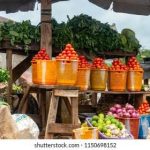To spearhead the transformation of Nigeria’s agricultural sector and achieve food sufficiency, President Bola Tinubu has been advised to declare a state of emergency in agriculture and actively participate in farming, alongside other innovative policies. This recommendation was made by Professor Abiodun Raufu, a former Nigerian Tribune editor and Assistant Professor at Southern University and A&M College in Louisiana, USA, in a statement released on Wednesday.
Raufu acknowledged the federal government’s recent decision to increase food imports and praised the President for directing the cultivation of all arable military land across the country. However, he argued that food imports are only a temporary solution. A state of emergency, he suggested, would facilitate resource mobilization and enable the government to implement comprehensive measures to address immediate farmer needs, restore damaged farmlands, enhance rural security, and introduce modern agricultural practices to withstand future challenges.
Raufu emphasized that tackling food security requires the involvement of all Nigerians, starting with the President. He noted that while the First Lady’s garden farm is commendable, the President’s personal engagement in farming could serve as a powerful symbol to encourage Nigerians to embrace agriculture, especially with abundant rainfall at this time of year.
“A country like Nigeria, with its vast arable and fertile land, should not face food shortages when nations with less fertile land, such as Israel and the United States, produce surplus food. With effective agricultural policies and leadership, we should be focusing on preserving and exporting excess produce,” Raufu said.
He further suggested that all political leaders should lead by example by participating in farming to motivate others to combat hunger and starvation. Raufu recommended a multi-faceted approach to food insecurity, using local government authorities as the core of an agricultural revolution, which should include investing in farm machinery, rural development, and high-yield seeds.




